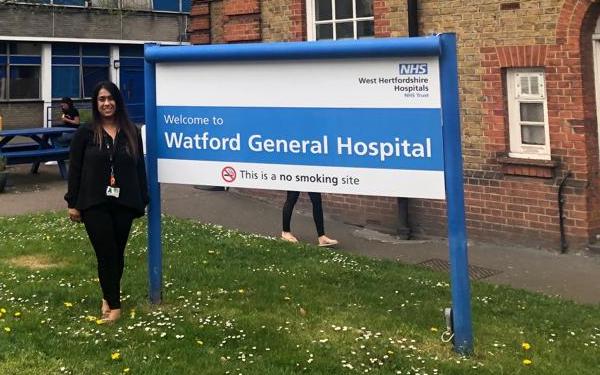Two years ago, Nashreen Lallmahomed entered Watford General Hospital and started a new chapter in her social care career.
She’d already spent 11 years working in Hertfordshire County Council’s community teams, but now she wanted something new. Something exciting and different. Something that would stretch her skills in new ways.
“I was looking for a challenge, as I felt I’d reached my ceiling in community social work,” she says.
The council’s hospital social work team in Watford General seemed an ideal fit: “In a community team you tend to work with one specific client group, like older people, but in hospital you never know what client group you’re going to be working with.
“It can be anybody from 18-plus, be that an older person with dementia, somebody with a learning disability, or someone from prison.”
Hard conversations
The variety of client groups keeps you on your toes, adds Nashreen, who is the team’s advanced practitioner.
The range of need means social workers must adapt constantly, digging into their social work toolbox on the fly for the appropriate approach for each individual on their ward.
“Everyone who comes into hospital is in a crisis situation,” she says. “You’re dealing with people who are very stressed, very upset and very anxious.
“The key is communicating and being available to the families. You need to be clear about why you’re doing things and sometimes those things are not always what the family wants to hear.
“There are situations where families don’t want their loved ones to move out of hospital, which is a challenge as we can’t allow people to stay in acute beds when they don’t need to.”
Real confidence booster
But it’s exactly this sort of challenge that makes hospital social work so rewarding for Nashreen.
“The best times are when there’s a case that’s very, very complex and you support someone who can’t support themselves to live the life they want to,” she says.
“Those times when somebody wants to go home and everybody else, including the family, is saying ‘no, no, no’, but you’ve weighed up the risk, followed the legislation, and then supported someone to go home.”
Making these decisions in the high-tempo environment of the hospital is a real confidence booster too.
“People sometimes have reservations about the fast pace of hospital work, but it really develops your confidence,” she says.
“I always tell the newly qualified social workers who join us: ‘Yes, it’s a fast-paced environment and, yes, there are lots of pressures, but after working here you can go into any sort of team because you will have dealt with quite challenging conversations and complex cases as well as building up a lot of resilience and confidence.'”
The newly qualified social workers seem to agree. Every one Nashreen has worked with at Watford General since joining two years ago is still there.
Strong camaraderie
Another reason why people stay is down to the strong camaraderie between the 40 or so members of the Watford General team, which includes discharge planning nurses and unqualified social care staff as well as social workers.
“The team is excellent at supporting each other and there’s a good team morale,” says Nashreen. “There’s always someone to talk to and cake and food about.
“People have to come and see it themselves to really understand how great a place this is to work in but those who do are blown away but the amount of support they get.”
Market forces payments
The support doesn’t end with the team, and Nashreen has nothing but praise for how Hertfordshire County Council supports its social workers.
“I’ve never seen a reason to leave Hertfordshire – they really do look after you,” she says. “They supported me to become a social worker, to do my masters, become a practice educator and now be an advanced practitioner.
“The opportunities I’ve had have been great and it’s not just me – everyone I know in the hospital team has developed, whether that’s by becoming a best interests assessor, moving up to the next grade or something else.”
The council’s hospital social workers also benefit from a market forces payment worth £2,000 or £4,000 a year depending on which of the county’s hospitals they work in.
Bringing health and care together
For Nashreen another rewarding part of the job is being able to help bridge the gap between the medical and social work models of care, even if that remains a work in progress.
“As all social workers know there’s always been a hierarchy between the social work and medical model, but I think that’s got a lot better from having social work teams in the hospital,” she says.
“It’s had a big influence on how doctors view social workers and helped us develop respect for each other’s profession.
“It’s not perfect and sometimes the older generation of service users feel what the doctor says takes priority, but that’s a challenge we, as social workers, can unpick by being here in the hospital.”




 Facebook
Facebook X
X LinkedIn
LinkedIn Instagram
Instagram